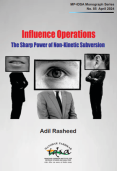Influence Operations: The Sharp Power of Non-Kinetic Subversion
nfluence Operations refers to the use of non-military means of Ipsychological, informational and political influence and subversion to undermine the security and governance of a targeted country. Revolutionised by 21st century Information Communication Technology (ICT), Influence Operations (or simply IOs) have today developed into a highly insidious, cost-effective and often non-attributable forms of hybrid warfare.
Political Islam: Parallel Currents in West Asia and South Asia
- Publisher: Pentagon Press
This book deals with the history of Muslim political thought from the time of the Prophet to early 21" century in `West Asia` (an Indian alternative to the `colonial` term Middle East) and South Asia. Although Islam does not present nor recommend any political philosophy or state-like system per se, Muslim scholars and theologians have over the centuries recommended ways for establishing an ideal Islamic polity based on Quranic inferences, precedents of the Prophet and some early Caliphs. Although Political Islam strictly refers to only a century-old religious-political revivalist movement, this book covers historical concepts and developments that serve as political antecedents for contemporary Political Islam in the two regions.
- ISBN: 9788195189458 ,
- Price: ₹ 1995/-
- E-copy available








